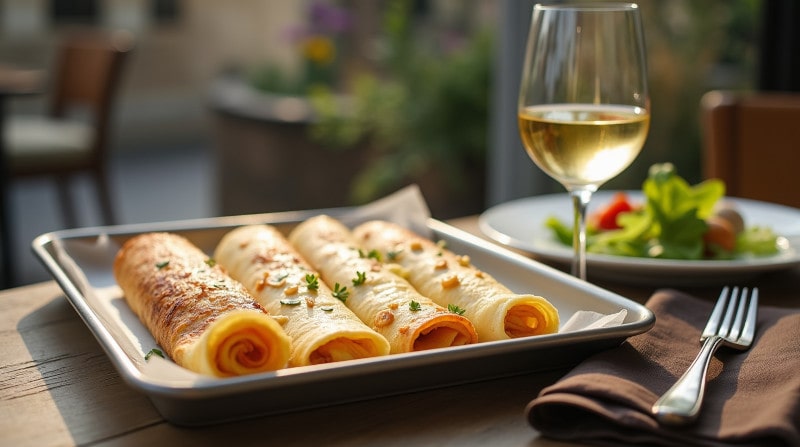Savoury, aromatic and light – a vegetarian spring dish with Austrian flair
Finely chopped spring herbs enhance the fluffy pancakes, which are spread with a creamy cream cheese and ricotta filling, rolled up and baked in the oven until crispy. A fresh Welschriesling from Western Styria is the perfect accompaniment – its fine acidity and lightness balance the dish perfectly.
The ideal wine accompaniment: Welschriesling from Weststeiermark DAC (Austria)
A Welschriesling from Western Styria brings exactly the freshness that this dish needs: Lemon zest, green apple notes and a racy, clear acidity. This structure emphasises the herbaceous component of the pancakes, while the cream cheese filling is elegantly framed by the lightness of the wine. The restrained fruitiness leaves room for the flavours of the dish without overpowering them – a prime example of a finely balanced wine to accompany vegetarian cuisine.
Another 5 suitable wine recommendations
1st Grüner Veltliner from the Kremstal DAC (Austria) Its classic aroma of white pepper, green apple and fine herbal spice perfectly complements the pancakes. The distinctive but not dominant acidity brings liveliness to the creamy filling and harmonises with the herbs.
2nd Pinot Blanc from Alsace AOC (France) Creaminess, subtle fruit and a cool elegance make this wine a charming companion. The Pinot Blanc is not too loud, leaves room for the filling and reflects the restrained freshness of the spring herbs.
3rd Silvaner from the Maindreieck (Franconia, Germany, QbA) The minerality and mild fruit of the Silvaner make it the ideal spring wine – especially with fine, herb-accentuated dishes. With a subtle spiciness and elegant restraint, it supports the fine components of the filling.
4. Soave Classico DOC (Veneto, Italy) A Garganega-accentuated Soave with almond notes, freshness and subtle herbal flavours that go excellently with the baked herb crust. The elegant texture clings to the pancake filling without being overpowering.
5. Pinot Blanc Alto Adige DOC (Italy) With ripe pears, fine citrus notes and an elegant structure, this Pinot Blanc from Alto Adige has a certain fullness to it that works perfectly with the cheese filling – at the same time, the freshness supports the lightness of the dish.
The recipe:
Baked herb pancakes with cream cheese filling
Cooking utensils
- 1 Pan
- 1 Whisk
- 1 Mixing bowl
- 1 Casserole dish
- 1 Grater
Ingredients
For the pancakes:
- 2 Eggs
- 120 g Flour
- 250 ml Milk
- 1 Pinch of salt
- 1 Tbsp finely chopped herbs z.e.g. chives, parsley, wild garlic
- Clarified butter or oil for frying
For the filling:
- 150 g Ricotta
- 100 g Cream cheese
- Salt & pepper
- 1 teaspoon lemon zest
- Optional: 1 handful of spinach or chard blanched and finely chopped
For gratinating:
- 2 Tbsp grated mountain cheese or parmesan
- 1 Tbsp butter
Preparation
Prepare the pancakes:
- Mix the eggs, milk, flour and salt into a smooth batter.
- Fold in the herbs and leave to rest for 10 minutes.
- Fry 3-4 thin pancakes in a hot pan with a little fat until golden brown.
Prepare the filling:
- Stir the ricotta, cream cheese, lemon zest, salt and pepper until smooth.
- Mix in spinach if desired.
Fill and bake:
- Spread the ricotta mixture on the pancakes, roll up and place in a greased baking dish.
- Sprinkle with butter flakes and cheese.
- Bake in the oven at 180 °C (top/bottom heat) for approx. 15-20 minutes.
Recommended side dishes
- Spring salad with radishes
- White asparagus with butter
- Roasted green asparagus with lemon

